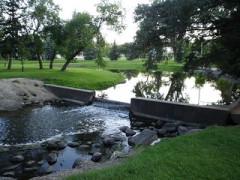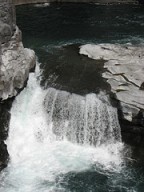
Water water everywhere!!! Shall we drink from the well? Shall we pray? (A prayer for grace I used 3 years ago)
So why do we sit here and complain that there is not enough water?
You call us to strike the rocks of our world and let your Living Water flow.
But we do not trust enough that the spring is there. We want to find the water on our own, using our own wisdom.
You call us to share the Water of Life with the world around us.
But we believe that the water is limited, not abundant and so we are tempted to save it for ourselves.
For all the times we turn away from your Water, for all the times we sully the Water by misusing it, for all the times we let others go thirsty instead of offering a drink,
Forgive us we pray.
…time of silent prayer…
The Water of Life flows with abundance to fill us with hope, to cleanse us of our guilt, to float us to a new life. Washed in the Living Water, we are forgiven and set free to live abundant life.
Thanks and praise to God. Amen.
This week the RCL readings do push us to think about water. See for yourself here.

Will you wander out into the desert and grumble with the people at Meribah? Or do you sometimes feel like Moses, with the people ready to stone you? I have always wanted to use a fountain with water spurting from a rock with this passage. You just get someone to turn the power on at the right point and…..
OR we could continue with Romans. No water there. (Not to suggest that Paul is dry or anything of course 😉 ) I am sure there are several sermons in the idea that suffering produces endurance produces character produces hope (verses 3-4). And many gallons of ink (and blood) have been spilled on the reconciliation/justification through the blood of Christ that Paul gets to at the end of this passage.

Then we have the John. One of the things I like about Lent in year A is that we have these long passages from John. Too often the RCL breaks a story up into little bits, but this season we get the story in its entirety. Just make sure your Reader has a glass of water handy. Mind you given the length of this story, and the depth of content, I suspect you could preach on it every Sunday of Lent and still have aspects to explore….
SO where are you going this week? Please share your comments, queries, ponderings, resources. And of course if you need a place to rant a bit that works too.
All photos in this week’s RCL Leanings are covered under a Creative COmmons License and came from the Flickr group “For Church Use (Creative Commons Only)” Individual picture details are in the links included in the captions.
.
.
.
.


In the strange situation of having more or less written Sunday’s sermon on John. And of preaching on the same text for the 3rd time – but really there is SO MUCH to say. If I was preaching on this text at church I’d be tempted to explore the exchange with the disciples – the bit I tend to put into brackets and more or less ignore. BUT Sunday I’m preaching at the protestant service at an interdenominational conference for the Alpha course. Given the setting, the woman’s experience seems relevant, so I’m pulling out 3 things that remind me of our course attendees (she meets Jésus in the midst of her everyday life, her somewhat complicated seeming circumstances are no barrier, and she becomes an excited and effective witness). As the length of the service is determined by the length of the Catholic mass happening in the chapel next door, I’m trying to keep to 15 minutes. Good discipline for me as my home church expects about 25 minutes. Some of the attendees come from denominations where women are not allowed to preach. Last year this worried me, but I got lovely feedback, so this year I’m just going to relax and enjoy the opportunity.
LikeLike
For World Day of Prayer, I read the John text as a first-person dramatic reading. Several church members said, “You have to do that again!” and I assured them the text would show up this week. For the sermon, I’m working from the theme of “what’s in your jar, that you need to set down at the feet of Jesus?” as we move into the middle of Lent. I’ve been trying to connect each week’s text in some way to the UMC Baptismal Covenant promises, This week, the question under consideration happens to be “Will you nurture these persons in Christ’s holy Church, that by your teaching and example they may be guided to accept God’s grace for themselves, to profess their faith openly, and to lead a Christian life?” This will tie in well with the response of the Samaritan woman’s neighbors who believe at first because of the woman’s testimony, then because “we have heard for ourselves, and we know that this is truly the Savior of the world.” We will see if I can connect all these ideas into a cohesive message!
LikeLike
I preached this text a few weeks ago (following the Narrative Lectionary) and it turned out to be one of my favorites. I offer it in case it’s helpful to anyone… If You See Something, Say Something
LikeLike
I had meant to check if this passage had been in the NL recently. Because I knew that then there would have been a discussion thread on it here…
Found the post:
https://revgalblogpals.org/2014/01/27/narrative-lectionary-in-laws-outlaws-ex-girlfriends-john-41-42/
LikeLike
I love this! Thanks for the precious insights. I particularly resonated with the way you dealt with the ‘noon” visit of the woman to the well in contrast to Nicodemus. The only reluctance I have about it is this– “the woman (a woman!) who represents all that is hated in Jewish culture…” Is this true? I think it isn’t. Maybe it reflects an old sense that Judaism was a repressive religion? Maybe needs reexamining. Thanks again.
LikeLike
Mary, I was thinking about how she was not only a woman, but also a Samaritan. the combination seems like it’s pretty well on the outs…
LikeLike
Samaritan yes, she was the ‘enemy’ in that sense; but just being a woman didn’t make her “hated” by anybody. I guess that’s what I was reacting to. I think we sometimes tend to exaggerate the extent to which women were ‘oppressed’ or ‘marginalized’ in ‘Jewish culture.’ Turns out not so much as we have been led to believe. By a long shot.
LikeLike
Oh, and thanks for responding!
LikeLike
Thanks for sharing this; I loved reading it. I liked your contrast between Nicodemus perhaps listening for the answers he wanted and the woman at the well really listening. I am toying with preaching about thirst and longing, and it seems like being able to hear what God offers (rather than what I want) may be part of the way our thirst is quenched.
LikeLike
I’ve been preaching on the OT texts this Lent and I think that will continue as we ponder being thirsty in the wilderness and how we assuage our thirst. My continuing theme is that God is calling us to step out courageously into unknown territory as the church in the 21st century–something this congregation needs to grasp.
LikeLike
I wrote a short piece for Abingdon’s Creative Preaching Annual on this text. It’s on my blog: http://marthaspong.com/2014/03/17/the-next-day-and-the-next/
LikeLike
Kris – great minds think alike. I am also doing the OT readings for Lent. Looking at the movement from individual failure to the possibilities of redemption, and this week, to the communal failure in relationship with God. Water is, of course, a necessity, especially when you’re wandering in the desert, and it’s understandable that folks would be testy when they are thirsty. And yet, where is the hope? Where is the trust? They may not trust Moses (can you imagine the number of times that poor man heard “are we there yet?”) but it seems they have forgotten their trust in God at the same time they forgot how miserable they had been in Egypt. so I guess the sermon that is percolating in my brain is about re-establishing one’s trust in God by remembering God’s work in our lives in the past..at least that’s where it seems to be going at this point. May not end up there, though…who knows?
LikeLike
we are using the Spill the Beans material for Sunday School, they are focussing on Exodus this week, and one idea is names. i am thinking of looking at how we name /label people. and how the woman had plenty of labels, but no name.
LikeLike